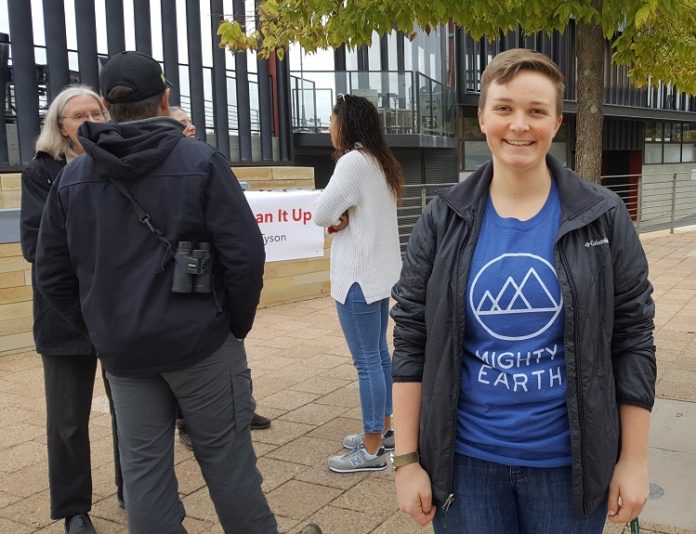
Mighty Earth, a coalition of some 20 groups representing business, agricultural and environmental communities around Iowa, released a letter Wednesday sent to Tyson Foods CEO Tom Hayes. The letter asked Hayes “to fulfill his sustainability promises by adopting specific practices that would reduce water pollution and protect natural landscapes across the country.”
Lucia von Reusner, Mighty Earth campaign director, said U.S. consumers “should not have to choose between producing food and having healthy, clean water. Our nation’s largest meat companies shape our food system on a massive scale and can implement solutions needed to make meat less polluting. It’s time for Tyson to clean it up.”
Tyson Foods, the largest processor and marketer of chicken, beef and pork in the U.S., produces one out of every five pounds of meat on the planet. The company employs 114,000 people in about 100 U.S. processing plants, and they are supplied by about 11,000 contract livestock producers.
Running Tyson as CEO since June 2016, Hayes is on record saying he will “place sustainability at the center of the company’s future plans.” He wants people to see “how much good food can do,” he said.
Standing along the Des Moines River Wednesday, Elise Peterson-Trujillo, Mighty Earth campaign organizer in Des Moines, said the letter to Hayes is aimed specifically at Tyson’s contribution to the dead zone in the Gulf of Mexico. The pollution causing the dead zone is largely the result of nutrient runoff from row crops, and the bulk of those crops go to fatten Tyson pigs, cows and chickens.
“Tyson as a big meat company needs a lot of food for their animals,” Peterson-Trujillo said, “but the current productions practices, the industrial-scale feed grains, puts a lot of excess fertilizer and other pollutants into our waterways, so we’re asking Tyson to commit to purchasing feed grown in certain ways that don’t pollute our waters as much. It’s really asking them to use their place in the industry to incentivize conservation practices on farms so that we don’t see as much water pollution from their supply chain.”
The conservation practices are already well known if not widely practiced by farmers, and they include cover crops and low or no tillage, buffers strips, fertilizer management and crop rotation to include small grains. It is simply a matter of supply and demand, Peterson-Trujillo said.
“The feed grain is produced because there is a demand from consumers,” she said, “but it can be produced in ways that don’t harm our public and environmental health as much. There’s a big potential for them to really shape the system for the better.”
Peterson-Trujillo was joined Wednesday by half-a-dozen supporters in announcing the letter to Hayes. Among the supporters was Bill Stowe, CEO of the Des Moines Water Works, who called for a moratorium on new construction of Concentrated Animal Feeding Operations (CAFOs) in January 2016.
“It certainly hasn’t caught on,” Stowe said Wednesday of his call for a CAFO moratorium, “but the Register among others are at least helping us to move the banner forward on the issue.”
Stowe also called for mandatory water-quality plans and conservation plans for every farm operation and to tie public farm subsidies to public health and environmental outcomes. Like the call for a CAFO moratorium, the ideas have not gotten traction in the Iowa Legislature, but Stowe is not pessimistic.
“The Farm Bureau and their allies are not going to have their way all the time,” he said. “That’s changing. We’ve never had this kind of open conversation about sustainable farming and moratoria. Ten years ago we wouldn’t have had it. So the tides are turning. They’re not turning as quickly as many of us would want them to, but we’re not going to go away.”
Reviewing the series of recent setbacks — from the federal judge’s dismissal of the Des Moines Water Works lawsuit to the Trump administration’s withdrawal of the Waters of the U.S. rule to the defunding of even the mildest critics of industrial agriculture, such as the Leopold Center for Sustainable Agriculture at Iowa State University and the IIHR Hydroscience and Engineering at the University of Iowa — Stowe was sanguine about the future of environmental quality in Iowa.
“There is a fundamental robustness in truth over power sometimes,” he said, “and I think that’s coming through. Even my friends at the Leopold Center, who were hardly rabid environmentalists but when it came right down to it were certainly great advocates for sustainable ag, are finding homes in other areas and will be back in one form or another.”
Hard science and informed public opinion will eventually decide these questions of policy.
“The demographic of the state’s changing,” Stowe said. “Like the people you see right here. These are folks who are not going to tolerate any more. At some point, the public health issues that are implicated in a lot of these environmental issues — these are more than canoeists and duck hunters — now we’re talking about economics and public health. Sooner or later, these issues will take the priority they need to.”
















